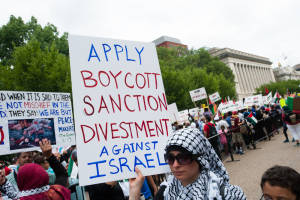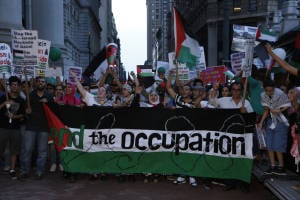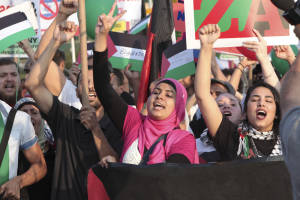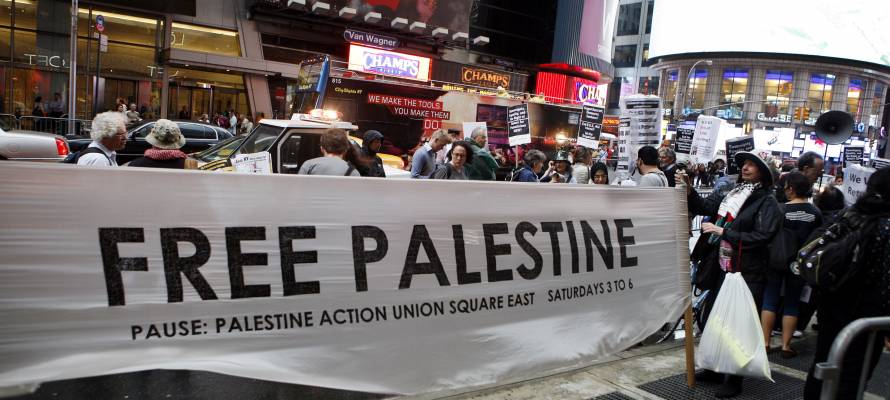Exposing the anti-Israel boycott movement for what it really is – an organization engaged in illegal activities in the US.
The BDS (Boycott, Divestment & Sanctions) Movement is active in the US, encouraging US companies, individuals and unions to participate in boycotts of Israeli businesses, US academic institutions to cease partnerships with their Israeli counterparts, managers of pensions and other funds to divest investments from Israel, and a variety of other measures meant to mislead Americans into isolating and financially damaging the State of Israel.
BDS claims its activities to be perfectly legal in the US: it describes itself as a grassroots organization targeting Israel in the same way that other groups targeted the South African Apartheid regime. The BDS Movement’s claimed objective is to stop Israel from acting as a modern apartheid regime and committing illegal acts against the Palestinians. The ultimate objective is to pressure Israel to agree to its own demise by allowing millions of Arabs to become citizens of the country, in lieu of the internationally supported two-state solution in the Middle East.
A scholarly legal paper recently published by an American law firm, however, exposes BDS for what it really is – an organization engaged in illegal activities in the US (subjecting its supporters to possible criminal and monetary penalties), with ties to terrorist organizations and objectives very different from what they suggest to the US public.
Dissecting BDS Claims
BDS Claim #1: Israel is an apartheid regime, similar to South Africa some years ago, and just as it was appropriate for US organizations and individuals to boycott South Africa then, so it is correct for US entities to boycott Israel now.
Arguing whether to label Israel as apartheid is outside the scope of this argument. Still, two important comments:
1. Richard Goldstone, a jurist from South Africa that led a UN investigation into Israel’s activities in Gaza during a war period that was very critical of Israel, stated:
In Israel, there is no apartheid. Nothing there comes close to the definition of apartheid under the 1998 Rome Statute: “Inhumane acts … committed in the context of an institutionalized regime of systematic oppression and domination by one racial group over any other racial group or groups and committed with the intention of maintaining that regime.”
Israeli Arabs — 20 percent of Israel’s population — vote, have political parties and representatives in the Knesset and occupy positions of acclaim, including on its Supreme Court. Arab patients lie alongside Jewish patients in Israeli hospitals, receiving identical treatment.
2. Arabic publicity campaigns have a habit of labeling Israel with a variety of ridiculous titles, not just comparing Israel to Apartheid South Africa, but also to Nazi Germany as well, suggesting that Israel behaves the same as the Nazis, including causing a Palestinian Holocaust, all the normal mode of operation to defame Israel unjustly.
While individuals may disagree over specific terms to use in describing Israel, what is more important is that from a US legal perspective there is a critical difference between Israel and Apartheid South Africa.
The US government at the time of Apartheid was opposed to the South African government’s policies and the US congress had imposed sanctions on the country. Thus, boycotting South Africa matched the US government’s interests at the time.

(shutterstock)
Not only has the United States not declared Israel to be an apartheid state or imposed sanctions on Israel, there are specific laws in the United States that prohibit participation in certain boycott activities. The best known of these laws, known as the EAA Anti-Boycott Law, explicitly announced that “[i]t is the policy of the United States to oppose restrictive trade practices or boycotts fostered or imposed by foreign countries against other countries friendly to the United States or against any United States person.”
This law was enacted specifically in opposition to the Arab boycott of Israel and the policy statement reflects American policy in support of, not in opposition to, Israel.
While those who boycotted South Africa’s Apartheid regime were acting in compliance with the United States’ law and policy, those who participate in boycotts against Israel are acting in direct contravention of law and policy.
BDS Claim #2: BDS wants Israel to accept a two-state solution.
Arab PR campaigns in English are oftentimes very different than what they proclaim in other forums, be that publicity in the Arabic language or less public manifestos. In the case of BDS, as much as they claim to support a two-state solution when speaking with US potential supporters and the mainstream media, which matches the interests of the US government, if you review their manifesto, it is remarkably similar to Hamas’ positions.
Included in this manifesto is the requirement for any agreement between Israel and the Palestinians to include full rights of return to Israel for anyone designated as a Palestinian Arabic refugee. Such a move would cause Israel to lose its Jewish majority and cease to exist as a Jewish State. This position is not supported by the United States.
The Palestinian Authority, which is negotiating with Israel (at least when they are agreeable to negotiating) clearly recognizes that this demand is a non-starter, and has shown great flexibility on this issue according to sources knowledgeable about the negotiations. Only terrorist organizations such as Hamas, which seek to remove Israel from the map, include such a requirement for “peace.” BDS is thus in quite illustrious company.

BDS supporters protest against Israel. (A. Katz/Shutterstock)
BDS Claim #3: BDS is a Grassroots Organization
The Arab League instituted a boycott against Israel in 1945, even before the official establishment of the modern State of Israel. BDS distinguishes itself from the Arab League boycott and claims to be independent and grassroots. Yet the Arab League boycott makes mention of using non-state organizations to further its goals, and BDS states clearly in many instances how they are picking up where the Arab League left off, and working to improve the results.
BDS was one of the outcomes of a meeting in Iran preparing for the Durban World Conference on Anti-Racism, which quickly descended into an anti-Israel event historically second-to-none, even when compared to UN General Assembly anti-Israel resolution discussions.
These Arabic non-state entities, whether they are BDS, Hamas, Hezbollah, al-Queda, or ISIS, or the mode de jour of the modern Arabic world: groups that are difficult to fully understand and define, yet with nefarious objectives and capabilities that would make any rebellious state proud, and with the convenient advantage of not having the same perceived responsibilities and culpabilities of a state.
BDS Legal Issues
EAA Anti-Boycott Law
The US currently has a law making it illegal for a US entity to participate in a boycott of a country that is friendly to the US when the boycott pressure is from a foreign originator. This law was created expressly to foil the Arab League’s secondary boycott against Israel. The Arab League’s primary boycott of Israel is restricted to the members of the Arab League boycotting Israel, actions which are outside the scope of US legislative interests.
However, a secondary boycott was also maintained by the Arab League. The Arab League central office in Syria administers a blacklist of international companies that have relationships (business or otherwise) with Israel, and Arab League members boycott these companies as well. The US anti-boycott law makes it illegal to boycott Israel due to pressure from these foreign (Arabic) interests. Essentially, the US wishes to be the one to control commerce in America, and not let foreign entities encroach upon this right.

Anti-Israel BDS protesters. (A. Katz/Shutterstock)
There have been many successful prosecutions over the years in the US against American companies that have tried to boycott Israel in order to receive economic benefits from Arab League members.
US participants in the BDS boycott have successfully avoided prosecution until now, since BDS claims that they fall into a category that is not covered by this law. The anti-boycott law specifies that it must be a foreign nation or state that is the instigator of the unlawful boycott. BDS found a legal organization that asserts that since BDS is neither a state nor a nation, it is not subject to the law.
However, the new scholarly legal paper clearly refutes this contention. In fact, it was always the objective of the United States government to prevent any foreign boycott from being carried out in the United States. BDS is clearly violating the spirit of the anti-boycott law as well as the letter of the law, as BDS is properly considered a representative of the Palestinian nation, which subjects BDS and its supporters to the enforcement provisions of the EAA Anti-Boycott Law.
Anti-Trust (Sherman Act)
American unions that adhere to the BDS boycott, in addition to violating US anti-boycott laws, may also be violating US anti-trust legislation, which preclude unions from negatively impacting US commerce in manners outside the scope of their traditional objectives (and boycotting Israel obviously falls into this category)
RICO
These regulations were created originally to combat organized crime/mafia organizational structures, where not only the one committing the crime is charged, but also the boss(es) of the criminal gangs are held liable, even if they didn’t commit the crime themselves.
What better metaphor can there be for the operation of the Arab League, Hamas, and BDS than this?
You have the Arab League, ironically similar to what the anti-Semitic world claims is the (Jewish) Protocol of the Elders, senior representatives of Arabic nations and states, designing boycotts to further their designs for Middle East domination.
Yet, since nowadays the members of the Arab League wish for peaceful relations with the international community, rather than carry out their escapades directly, they use organizations such as BDS to maintain their activities.
And BDS, together with various representatives of the Palestinian nation including Hamas, Islamic Jihad, and other terrorist organizations, continue with the rejectionist attitudes towards Israel, with the ultimate goal of complete elimination of the Jewish State.
Hamas and BDS share the same objectives, and more than this, the new scholarly legal paper asserts that there are strong indications that BDS and Hamas share information, finances, and resources. This subjects BDS and its supporters to the anti-terrorism laws that were put in place by the United States in the wake of the 2001 al Qaeda terror attacks.
And, as Hamas is known to use woman, children and UN schools in Gaza as (human) shields to hide their ammunition and control centers, BDS uses innocent Americans, unaware of their illegal nature and true ambitions, to act as human shields in their boycotts and divestment activities.
The hope is that with the new information provided in the new scholarly legal paper, US legislators will use all legal means available to prosecute BDS and the American organizations and individuals who participate in BDS boycotts, whether they are companies or unions.
And, for US academic institutions, managers of financial funds, and non-profits that have already or are considering ceasing investments, cooperation and/or relationships with Israel, to re-consider and investigate in more depth, so that they can understand exactly who BDS is, what they stand for, and not be misled by their mischaracterizations and lies.
Does any organization really want to align itself with such a disingenuous and dangerous movement as BDS?
By: Ron Machol
